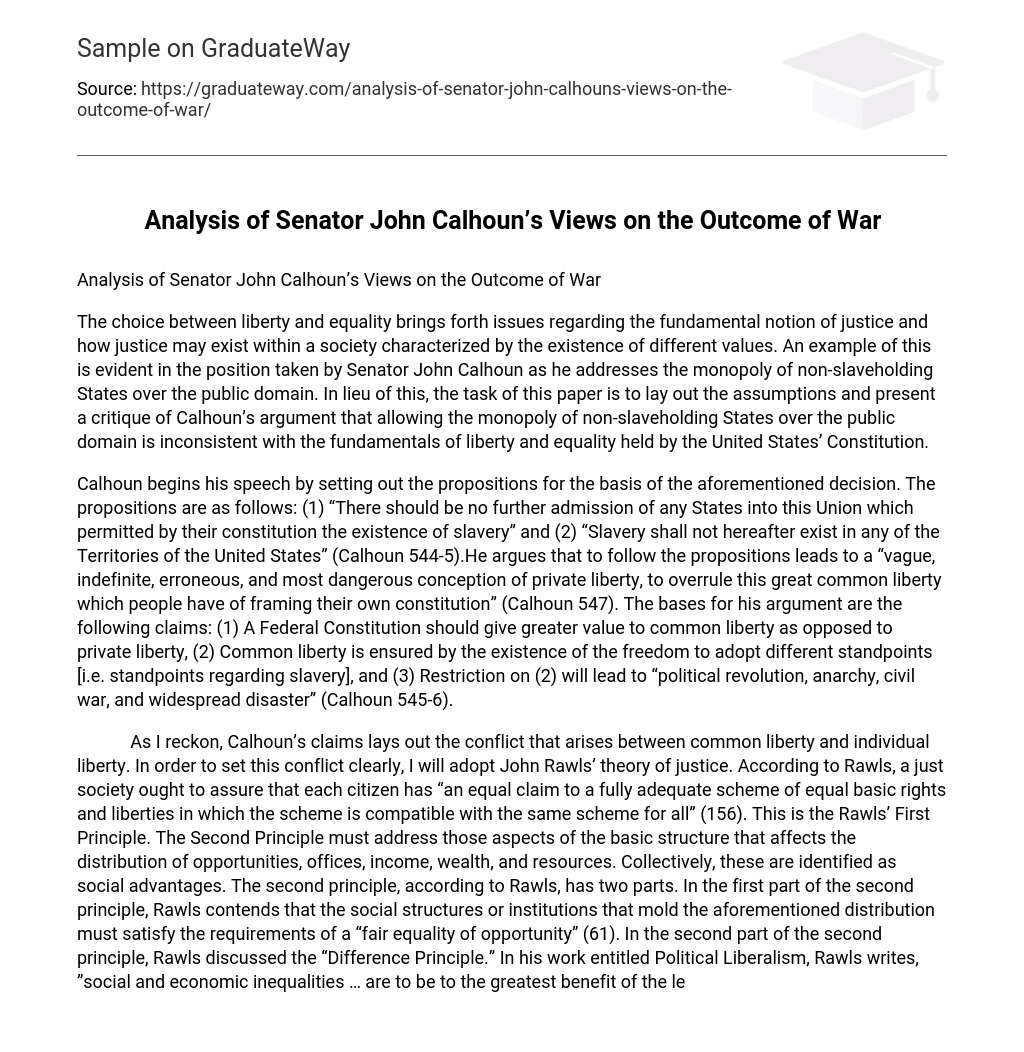The choice between liberty and equality brings forth issues regarding the fundamental notion of justice and how justice may exist within a society characterized by the existence of different values. An example of this is evident in the position taken by Senator John Calhoun as he addresses the monopoly of non-slaveholding States over the public domain. In lieu of this, the task of this paper is to lay out the assumptions and present a critique of Calhoun’s argument that allowing the monopoly of non-slaveholding States over the public domain is inconsistent with the fundamentals of liberty and equality held by the United States’ Constitution.
Calhoun begins his speech by setting out the propositions for the basis of the aforementioned decision. The propositions are as follows: (1) “There should be no further admission of any States into this Union which permitted by their constitution the existence of slavery” and (2) “Slavery shall not hereafter exist in any of the Territories of the United States” (Calhoun 544-5).He argues that to follow the propositions leads to a “vague, indefinite, erroneous, and most dangerous conception of private liberty, to overrule this great common liberty which people have of framing their own constitution” (Calhoun 547). The bases for his argument are the following claims: (1) A Federal Constitution should give greater value to common liberty as opposed to private liberty, (2) Common liberty is ensured by the existence of the freedom to adopt different standpoints [i.e. standpoints regarding slavery], and (3) Restriction on (2) will lead to “political revolution, anarchy, civil war, and widespread disaster” (Calhoun 545-6).
As I reckon, Calhoun’s claims lays out the conflict that arises between common liberty and individual liberty. In order to set this conflict clearly, I will adopt John Rawls’ theory of justice. According to Rawls, a just society ought to assure that each citizen has “an equal claim to a fully adequate scheme of equal basic rights and liberties in which the scheme is compatible with the same scheme for all” (156). This is the Rawls’ First Principle. The Second Principle must address those aspects of the basic structure that affects the distribution of opportunities, offices, income, wealth, and resources. Collectively, these are identified as social advantages. The second principle, according to Rawls, has two parts. In the first part of the second principle, Rawls contends that the social structures or institutions that mold the aforementioned distribution must satisfy the requirements of a “fair equality of opportunity” (61). In the second part of the second principle, Rawls discussed the “Difference Principle.” In his work entitled Political Liberalism, Rawls writes, ”social and economic inequalities … are to be to the greatest benefit of the least advantaged members of society” (6).
Within this context, one might note that the problem with Calhoun’s claims as presented above lies in his failure to recognize the importance of recognizing that the existence of common liberty is dependent upon ensuring the liberty of each individual. Since it is within the scope of the State’s mandate to ensure the existence of individual liberty, although certain inequalities may result from ensuring the greatest benefit of the least advantaged members within society, such measures are necessary in order to ensure the existence of a just society. In the context of the aforementioned speech, the action of the Union to allow control of the public sphere to the non-slaveholding States stands as a result of the Union’s means of ensuring that the States which do not recognize individual equality within their own domains will be restricted from gaining the full social and economic benefits of a democratic nation.
Works Cited
Calhoun, John. “Senator John C. Calhoun Offers a Southern Perspective on the War’s Outcome, 1847.” Major Problems in the Early Republic, 1787-1848: Documents and Essays. Ed. Sean Wilentz. Massachusetts: D.C. Heath, 1992.
Rawls, John. A Theory of Justice. Harvard: Harvard University Press, 2004.
___. Political Liberalism. Columbia: Columbia University Press, 1993.





